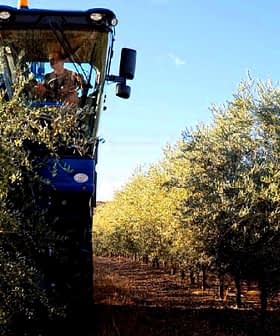Nikos Michelakis, a scientific advisor of SEDIK, the Association of Cretan Olive Municipalities, and a former director of the Olive Institute of Chania, recently discussed the status of the olive oil sector in Greece with Olive Oil Times.
Michelakis said the amount of olive oil to be produced this season at the international, national and local levels, olive oil imports from Tunisia, and “the economic situation of producers and buyers” in Greece, which is unique after six years of economic crisis and almost five months of capital controls, all tend to reduce producers’ prices.
Moreover, new measures are expected to significantly increase taxes on Greek farmers, some farmers in Crete are struggling with a shortage of foreign laborers, and no one has been sure when European Union farm subsidies would be paid. There has already been a long delay beyond the usual October subsidy distribution, and Michelakis finds governmental announcements about payment at the beginning of December overoptimistic.
SEDIK’s price data show that producers’ olive oil prices were significantly reduced in early to mid-November in all the major olive oil-producing countries, with extra virgin olive oil of 0.3 percent acidity, most recently fluctuating between €2.80 to €3.00 /kg in Greece, €2.89 to €4.29 /kg in Spain (average €3.03), and €3.35 to €4.00 /kg in Italy. Michelakis reported that producers and traders attribute this development to the expected harvest and, even more, to the duty-free imports from Tunisia.
Michelakis has criticized the European Commission’s decision to increase duty-free imports of Tunisian olive oil into the EU by 35,000 metric tons (in addition to the usual 56,700 annually) by the end of 2017. While he realized that the decision was justified as supporting the Tunisian economy after severe losses in the tourism sector following the terrorist attacks last July, Michelakis suggested that the offer to import from Tunisia “more than half of its average annual production, amounting to 160,000 tons,” was not a purely humanitarian gesture of direct economic support to Tunisia.
Rather, Μichelakis suggested that the main reason for the plan “seems to be the desire of the European standardization industry to ensure lower product prices.” He argued that this increase of duty-free olive oil imports into the EU “benefits the EU (olive oil) standardization industries, particularly in Italy and Spain,” since the new policy “increases the availability of a cheaper product for standardization industries that will compete” with olive oil produced in Europe, reducing the prices of European farmers’ products and decreasing their income. He contends that this helps to explain the “downward trend in prices that began immediately after the announcement.”
Michelakis mentioned that Copa-Cogeca, the organization representing European farmers and cooperatives, submitted a memorandum to the European Commission expressing its opposition to the EU plan. At the time of his interview, he was surprised not to have heard any expressions of concern from Greek agricultural organizations, in spite of what he called potentially “catastrophic repercussions” on the European market that could “threaten growth and jobs in the member states of the south.”
The Greek Minister of Rural Development and Food, Evangelos Apostolou, more recently mentioned to the European Council of Agriculture and Fisheries Ministers that “we must carefully examine the impact of such concessions on European producers,” as Agrocapital reports. Even so, on November 24, after producers faced a significant drop in olive oil prices in Heraklion, Crete (from €3.50 to €2.80 /kg), Nea Kriti reported that Vasilis Kegeroglou, a member of Parliament from Crete, asked the Minister to “rectify” the problem many believed was created by the increase in the Tunisian import quota. The same day, Agonaskritis reported that the president of the Union of Agricultural Cooperatives of Heraklion, Andreas Stratakis, asked Prime Minister Alexis Tsipras to remove Apostolou from his position as Minister of Rural Development and Food since he “consents” to the increased import quota from Tunisia.
Problems are piling up for many Greek producers, who hardly need more difficulties. Michelakis explained that SEDIK’s goals include increasing the use of olive oil in catering establishments and restaurants, improving the diets of Cretans and visitors to Crete, developing gastronomic tourism, and promoting the consumption of local products, thereby providing more employment on the island.
One of SEDIK’s initiatives is a campaign to increase “awareness of youth on the health, taste, and cultural value of olive oil” in cooperation with the International Olive Oil Council. In addition to sponsoring the publication of educational materials about olive oil in both Greek and English, SEDIK has invited municipalities, schools, teachers, and parents to join them in organizing special events for children throughout Crete that could include discussions, DVDs, games, exhibits, and tastings of dishes made with olive oil.
Eight years ago, SEDIK established the Olive Tastes Network of Crete to promote the healthy, tasty, and cultural value of Cretan olive oil and related products through inspection and certification of restaurants using olive oil as their only oil, and by providing labeling, information, and advertising in Greek and English. (Next year, it intends to begin certifying stores as well.) Two years ago, it began to receive funding from the EU to expand the network to include Cyprus.
In early November, Michelakis reported, the General Assembly of the Olive Tastes Network met at the offices of SEDIK in Chania, Crete to discuss their goals and concerns. These include a push for clearer indications on menus of the type of oil used by restaurants, especially for frying, and an exploration of the feasibility of requiring single-use branded packaging for fresh olive oil provided on restaurant tables in Greece. Many other major olive oil-producing countries require this, since it helps promote the health benefits and taste of high-quality olive oil, increases brand recognition and appreciation, and supports the development of gastronomic tourism.








